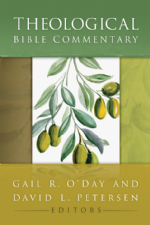$19.99
If you are already a Laridian customer, log in above and we can tell you if you own this product.
This product is also available in the following bundles or collections:
Preview Book
Preview the table of contents and a limited selection of text from this book.

Theological Bible Commentary
$19.99
Buy It Once, Use It On These Platforms
Description
Most one-volume Bible commentaries focus on standard scholarly issues, answering questions such as, who wrote the book? who was addressed? and how is the book structured? In contrast, this is the first one-volume commentary to emphasize theological questions: what does each biblical book say about God? how does the book describe God and portray God's actions? and who is God in these biblical books? This volume meets the need for a resource that puts the best of scholarship in conversation with the theological claims of the biblical text.
In conceiving this volume, the goal was to create a resource that modeled diverse ways of thinking theologically about biblical literature. This volume's distinctiveness is in the way it conceives of the practice of biblical theological reflection. Its starting point is the theological richness and diversity of the biblical texts as books of the Bible. To take such an approach to biblical theological work means that theological reflection begins with and receives its fundamental shape from its engagement with fully formed biblical books.
Such a starting point for biblical theological engagement is more unusual than it seems at first glance. In this volume, theological reflection is not centered on favorite or seminal passages, nor on scholarly constructions of the biblical material and its theological trajectories (e.g., the Deuteronomistic History, the Tetrateuch, Q, the historical Jesus), nor on overarching theological themes (“covenant,” “justification by faith,” “creation,” “incarnation”) whose roots are in the biblical material. This biblical theological commentary is textual theological reflection, contingent on the fully formed biblical books. Further, this approach does not privilege one biblical book over another. This volume is not predicated upon the notion of a theological center or fulcrum for either the Old or New Testament. Each biblical book serves as the basis for theological reflection in this commentary.
Yet this emphasis on canonical form does not produce a “canonical” reading in the conventional sense of that term. There is no attempt to create a uniform theological voice out of canonical diversity, nor is the theological perspective of one biblical book measured against or harmonized with the theological perspective of another. Nor do the authors write from the conviction that one theological norm or one way of understanding and doing theology should receive pride of place. Instead, the volume contains a series of individual theological commentaries that together offer a glimpse into the wealth of theological perspectives that the contemporary reader can find in the Bible. What all the essays have in common is a commitment to address fundamental theological issues from the perspective of a careful analysis of biblical literature.
The diversity of theological methods and approaches in this commentary reflects the theological richness and diversity of the biblical books themselves. No single methodological template has been followed by the authors (other than the very general organizational rubrics of “introduction” and “commentary”). For some of the volume's contributors, the exegetical theological engagement leads to reflection on primary theological themes (e.g., the nature of God, what it is to be human, the nature of human community), while for others this engagement leads to theological reflection through the lens of a particular biblical book on a range of topics (war and peace, justice, poverty) that were important topics in biblical times and remain so today. The common thread that runs through the commentary is the recognition that theological reflection on biblical texts is an essential intellectual and theological practice that can and should be undertaken from as many perspectives as possible.
System Requirements
Installed size (unless otherwise indicated): Approximately 1.625 MB. iPhone, iPad, and iPod touch Requires iPhone, iPod touch, or iPad running latest version of iOS. Download size: 1.625 MB. Android Requires Android OS 4.4 or later. Download size: 1.625 MB. Windows Requires Windows 10, 11 or later. Download size: 1.625 MB. macOS Requires macOS 10.13 or later. Download size: 1.625 MB.
The Fine Print
Copyright © 2010-2026 by Laridian, Inc. All Rights Reserved.
Laridian and PocketBible are registered trademarks of Laridian, Inc. DailyReader, MyBible, Memorize!, PrayerPartner, eTract, BookBuilder, VerseLinker, iPocketBible, DocAnalyzer, Change the way you look at the Bible, and The Bible. Anywhere. are trademarks of Laridian, Inc. Other marks are the property of their respective owners.
About You
- You are viewing the mobile version of our website.
- You are not logged in.
- Your IP Address: 216.73.216.22
- Site IP Address: 69.167.186.191
Social Media
Like and follow us on Facebook.
Stay Informed
We announce new products via email. If you ask to be removed from any of our mailings, you will not receive these notifications. If your email address changes, make sure you change it here, too.
From time to time we post things on our blog and on Facebook.
The Fine Print
Copyright © 2010-2026 by Laridian, Inc. All Rights Reserved.
Laridian, PocketBible, and MyBible are registered trademarks of Laridian, Inc. DailyReader, Memorize!, PrayerPartner, eTract, BookBuilder, VerseLinker, iPocketBible, DocAnalyzer, Change the way you look at the Bible, and The Bible. Anywhere. are trademarks of Laridian, Inc. Other marks are the property of their respective owners.
Products by Platform
Bible Reader Software
BookBuilder Software
- BookBuilder for Windows
- BookBuilder Pro for Windows
- BookBuilder for macOS
- BookBuilder Pro for macOS
- Self-Publishing Info
About Laridian
Products by Type
Your Account
- You are not logged in.
- Your IP Address: 216.73.216.22
- Site IP Address: 69.167.186.191
- Your Account Information
- Your Order History
- Your Downloads
- Your Notes, Highlights, and Bookmarks
- Your BookBuilder Books
- Your Shopping Cart
- Register Purchase from a Store
Best Ways to Get Help
You can get the fastest help by helping yourself.
- Make sure you download and install the PocketBible app that is required to read the Bibles or books you bought
- Read the confirmation email we send you when you make a purchase
- Read the help that's built into each of our products
- Look through our Frequently Asked Questions
- Submit a Support Ticket
- Email us at support@laridian.com

 Theological Bible Commentary
Theological Bible Commentary



